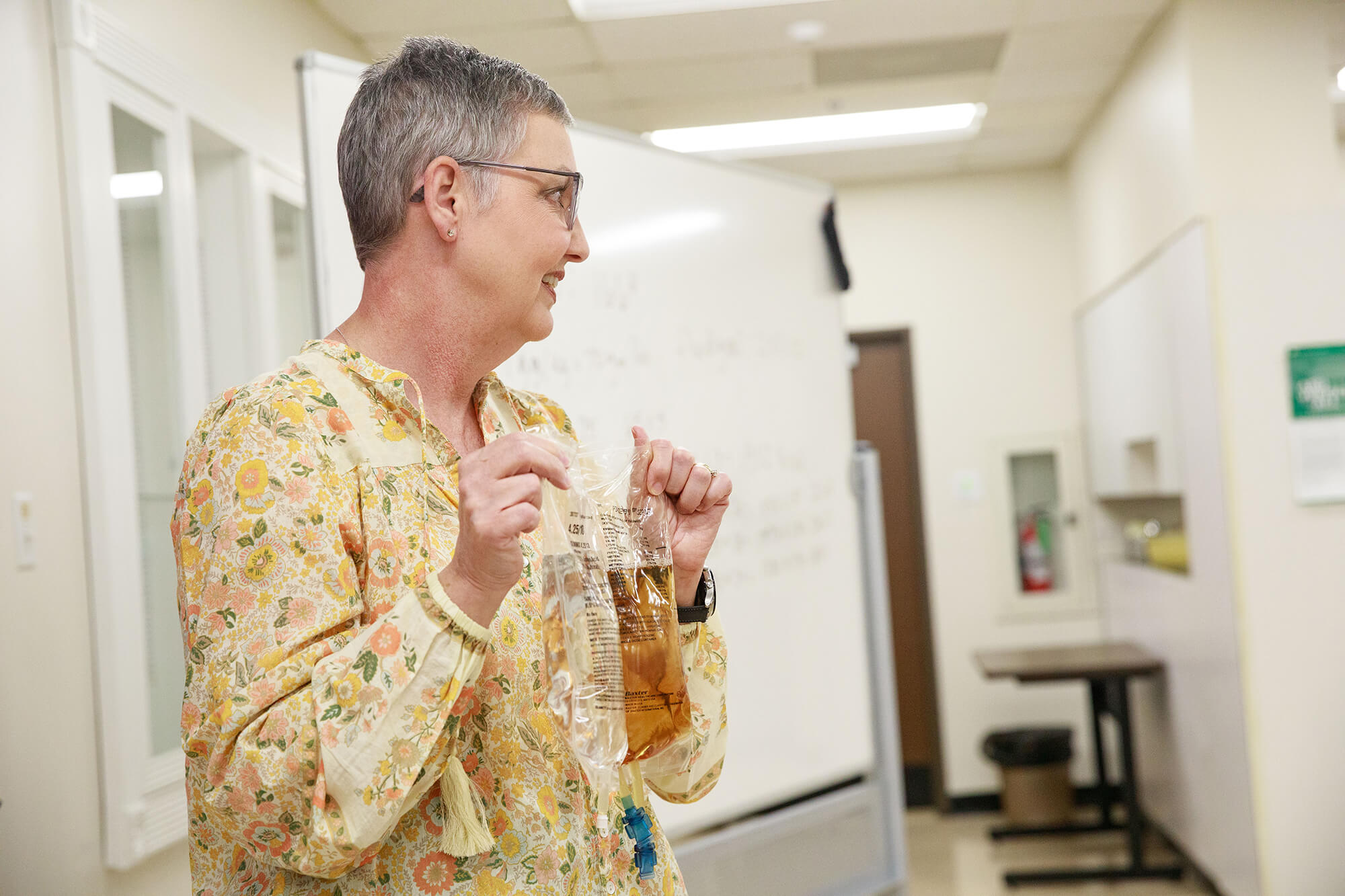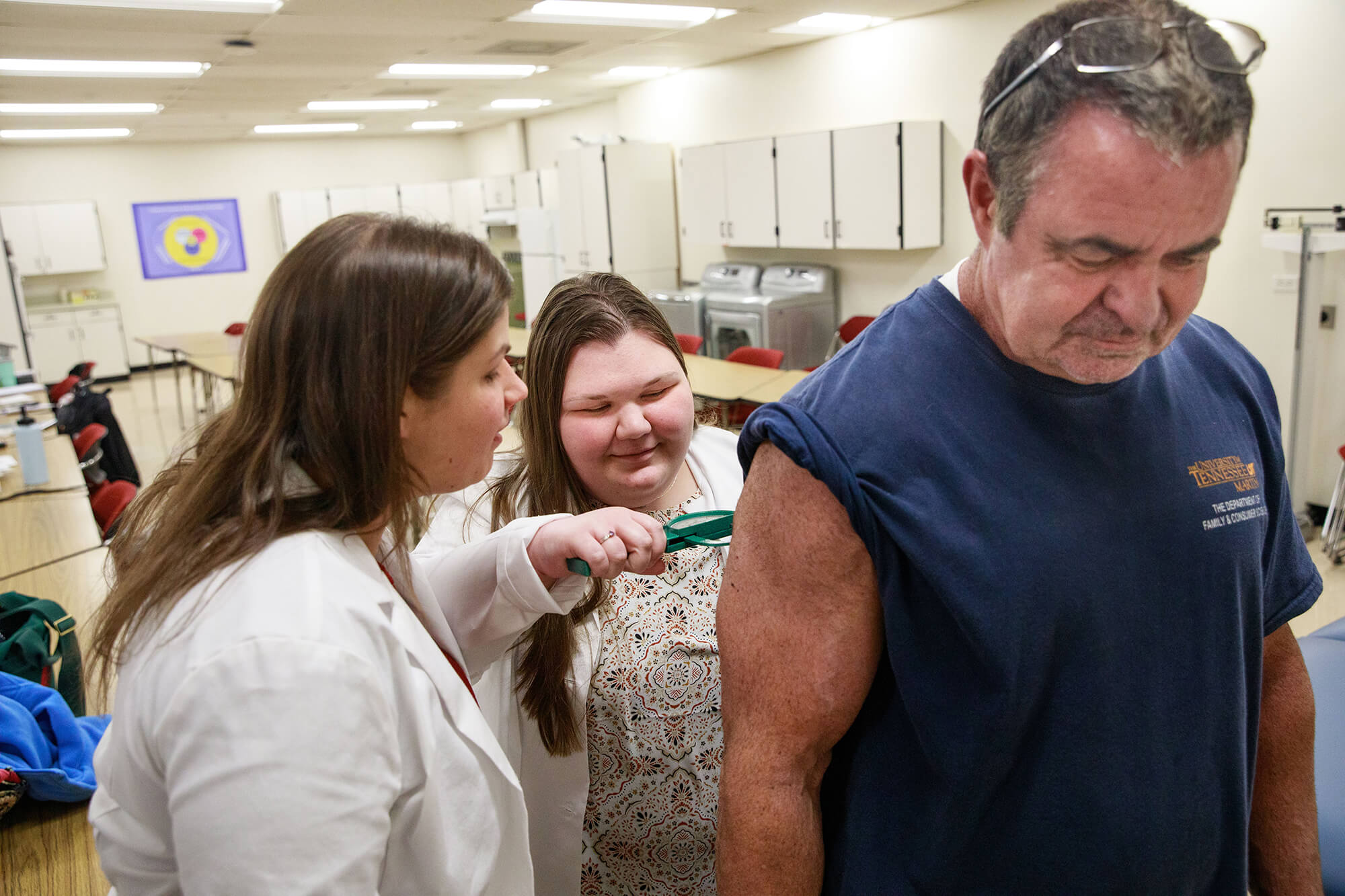This concentration area will prepare you for accredited dietetic graduate programs such as UT Martin's Master of Science in Family and Consumer Sciences in dietetics. Completion of an accredited graduate dietetics program leads to eligibility to take the Registration Examination for Dietitian Nutritionists.
This is a science-based program focusing on adult education theory and the application of information to improve quality of life for individuals and communities. Completion of the dietetics concentration requires admission into the Didactic Program in Dietetics. To become a registered dietitian nutritionist, a master’s degree is required.
This concentration is being phased out and the Didactic Program in Dietetics (DPD) will officially end on January 25, 2029 when the accreditation for the program expires. No new students are being accepted into this program unless it can be determined that they would be able to complete all of the program requirements and graduate in December 2028 (and they meet the criteria to be eligible for acceptance into the program).
This program is being transitioned to a graduate level accredited program, however, accreditation approval has not yet been received as we are in the candidacy stage of our application. We are anticipating that we may be able to accept students into a new accredited graduate program in Fall 2027. More information will be forthcoming as more information becomes available.
Students wanting to become registered dietitians that are not already in the program or who will not be able to complete the program by December 2028, should enroll in the Food and Nutrition concentration. Students in the Food and Nutrition concentration will not earn a verification statement which is needed by some accredited graduate dietetics programs, but they would be eligible to apply to those graduate dietetics programs that do not require a verification statement to complete the educational pathway to become a registered dietitian.
The Didactic Program in Dietetics (DPD) at the University of Tennessee is currently granted Accreditation status by the Accreditation Council for Education in Nutrition and Dietetics (ACEND) of the Academy of Nutrition and Dietetics, 120 South Riverside Plaza, Suite 2190, Chicago, Illinois 60606-6995, 800/877-1600, ext. 5400, www.eatrightpro.org/acend.
Prospective students will be considered for entry to the DPD based upon criteria listed in the catalog in effect when they enroll in the university. As the program is being phased out (as it transitions to a graduate program), students that are able to complete the DPD program requirements prior to the program closing will need to be under the 2024-2025 catalog or earlier.
The mission of the Didactic Program in Dietetics at the University of Tennessee at Martin is to prepare students for supervised practice leading to eligibility for the CDR credentialing exam to become registered dietitian nutritionists. Grounded in adult education theory, the science-based curriculum emphasizes critical thinking, team work, and authentic application of information. Graduates will acquire the skills necessary for both dietetics-related professional practice and lifelong learning.
Outcome 1: At least 80% of program students complete program/degree requirements within three years (150% of program length).
Outcome 2: In surveys from field experience preceptors, at least 75% of respondents will indicate agreement with respect to preparation of UTM senior dietetic students in each of the following areas: science-based knowledge required of dietetics professionals, community nutrition, food service operations, multicultural awareness, and both oral and written communication skills.
Outcome 3: In surveys from Supervised Practice Program Directors, at least 75% of respondents will indicate satisfaction with graduates preparation for supervised practice and indicate agreement with respect to UTM graduates’ preparation in each of the following areas: science-based knowledge required of dietetics professionals, community nutrition, food service operations, multicultural awareness, and both oral and written communication skills.
Outcome 4: In surveys from graduating DPD seniors, at least 75% of respondents will indicate feeling adequately prepared for their field experience.
Outcome 5: At least 75% of program graduates apply for admission to a supervised practice program prior to or within 12 months of program graduation.
Outcome 6: Of program graduates who apply to a supervised practice program, at least 75 percent are admitted within 12 months of graduation.
Outcome 7: Of the graduates who are accepted for supervised practice within 12 months of program completion, at least 75% will indicate feeling adequately prepared for their Dietetic Internship/Supervised Practice.
Outcome 8: Of the graduates who do not apply for supervised practice programs within 12 months of program completion, at least 60% of graduates will obtain employment in a dietetics-related field or enroll in either a graduate or continuing education program.
Outcome 9: Within 12 months of graduation, program graduates will be rated as performing at an adequate or higher level in their supervised practice, graduate program, or employment.
Outcome 10: Of graduates who are accepted to a supervised practice program, at least 75% will successfully complete the program within 150% of the program's length.
Outcome 1: The program’s one year pass rate (graduates who pass the exam within one year of first attempt) on the CDR credentialing exam for dietitian nutritionists is at least 80%.
Outcome 2: At least 75% of program graduates will indicate that they used the study review guide for the registered dietitian nutritionist exam provided to them in their senior year as additional preparation for their supervised practice program and in preparation for taking the registration exam.
Outcome 3: At least 25% of program graduates will become preceptors for UT Martin within 3 years of passing the RDN exam.
Outcome 4: At least 30% of program graduates will be members of the Academy of Nutrition and Dietetics or another related professional organization within 3 years of passing the RDN exam.
Program outcomes data is available by request by sending an email to the program director, Dr. Amy Richards, at aricha54@utm.edu.
An undergraduate degree in dietetics is frequently the first step in becoming a registered and licensed dietitian nutritionist. Admission to the Didactic Program in Dietetics at UTM (working towards an undergraduate degree in Family and Consumer Sciences with an emphasis in dietetics) occurs after entry level courses are completed as well as other criteria being completed. Application to the DPD program typically occurs at the end of the sophomore year.
If an individual already has a bachelor’s degree and is interested in becoming a registered dietitian nutritionist, a second bachelor’s degree does not need to be completed, but rather specific, additional undergraduate coursework must be completed and then application to a post baccalaureate dietetic internship occurs. A Verification Statement is earned upon completion of needed undergraduate coursework and is required as part of the pathway to become a registered dietitian.
Completion of an undergraduate degree in dietetics from a Didactic Program in Dietetics (DPD) accredited by ACEND is the usual pathway for students to meet the coursework requirements for accredited graduate dietetics programs.
In the senior year of the dietetics program (or final year of completing undergraduate coursework if the student already has a prior degree), students apply for graduate dietetics programs that are accredited by the Accreditation Council for Education in Nutrition and Dietetics (ACEND). Accredited graduate dietetics programs require the completion of a minimum of 1000 hours of supervised practice which may be in the form a dietetic internship or may be in the form of a Future Education Model (FEM) graduate program.
The application process for the majority of accredited graduate dietetics programs is completed through a national online application system called DICAS that allows for one application to be completed, tailored, and submitted to multiple accredited graduate dietetics programs. Applications can be submitted through DICAS in February and November, however, UTM students typically submit their applications in February due to the timeframe for completion of their undergraduate courses.
For their application to ACEND accredited graduate dietetics programs, students need to list and describe work and volunteer experiences relevant to dietetics; leadership experience; honors and awards; and educational information. A resume is also submitted along with a personal statement that makes the case for why the internship should select the applicant. Additionally, strong references are needed from faculty members and others that attest to the potential for the student to be successful.
Additionally, to be considered by most internships, students must set up an account with D & D Digital and enter the name of internships that they are applying and rank the order of preference for the internships that they list. Internships also rank the order of applicants by their preference of who they would most like to accept into their programs. D & D Digital uses a computerized system that matches students to internships based upon both the ranking of the student and the ranking of the internship. More information about the matching process can be found at https://www.dnddigital.com/ada/questions.php
Not all students who complete a bachelor's degree in dietetics are accepted into a graduate program in dietetics. Most graduate programs require a 3.0 GPA and those students with higher GPAs, related work and volunteer experience, and good references are more likely to be accepted into a graduate program. A GPA of 3.5 or higher is recommended.
Accredited graduate dietetics programs last about two academic years and require the completion of a master's degree. As a result, students should plan to spend an additional two years after the completion of a bachelor’s degree to complete the requirements necessary to be able to sit for the national registration examination to become a registered dietitian nutritionist. Federal financial aid is typically available for master’s degree programs in dietetics.
Information about accredited graduate dietetics programs is available on the Academy of Nutrition and Dietetics website at https://www.eatrightpro.org/acend/accredited-programs/about-accredited-programs.
Once a dietetic internship has been completed, a national registration examination must be taken and passed to become a registered dietitian. Registration exam requirements are set by the Commission on Dietetic Registration (CDR). Additionally, in most states including Tennessee, state licensure must be applied for and maintained. Throughout one’s career, continuing education is required to maintain registration and licensure.
Completion of the UTM undergraduate dietetics program along with the completion of an ACEND accredited dietetic internship will meet the requirements of licensure in all states that have licensure for registered dietitians. For more information about state licensure requirements click here.
Program graduates are eligible to become registered once they have completed an accredited graduate dietetics program and have earned a verification statement that documents their eligibility to take the registration exam. Registration is obtained by successfully passing a standardized exam that CDR oversees. Information about the registration process is available on the CDR website at https://www.cdrnet.org/Students.
In most states, graduates must obtain licensure to be able to practice as a dietitian or a nutritionist. Licensure is a separate step that occurs after the educational process has been completed and the registration examination has been passed. Tennessee legislation regulates the practice of dietetics. Graduates of the BS in dietetics must complete a master’s degree that includes supervised practice (such as a dietetic internship affiliated with a master’s program) and pass the registration exam prior to being eligible to apply for licensure in the state of Tennessee. For more information about state licensure requirements, visit CDR\'s State Licensure webpage. CDR's State Licensure webpage
If an individual is not accepted into an accredited master's level dietetics program or decides that he or she does not want to pursue a master's degree and credentialing, an alternative pathway is available. Upon completion of a bachelor’s degree in dietetics, students are eligible to sit for the registration examination for the Nutrition and Dietetic Technician Registered (NDTR).
The initial steps to become an NDTR are the same as for a RDN with application to the DPD and completion of a degree in dietetics (or alternative degree and completion of a Verification Statement to document all needed coursework has been completed). Upon passing the NDTR examination, the individual is able to practice in hospitals, medical clinics, and long-term care facilities under the supervision of a registered dietitian nutritionist when working directly with patients and independently when working in areas that do not require medical supervision such as school food service and community wellness programs.
For more information about becoming a NDTR, please visit the Academy of Nutrition and Dietetics’ website
Graduates of the Didactic Program in Dietetics at the University of Tennessee at Martin receive Verification Statements from the program director, establishing eligibility for an accredited graduate program. Successful completion of an ACEND-accredited graduate program is required to write the Registration Examination for Dietitians, which is administered by the Commission on Dietetic Registration(CDR). More information can be found on the ACEND website. https://www.eatrightpro.org/acend/accredited-programs/about-accredited-programs





